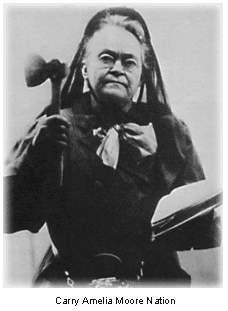This hatchet-wielding crusader is remembered for her attacks on liquor establishments in Kansas and other states during the late 19th and early 20th centuries.
 Carry Amelia was born November 25, 1846 to George Moore, a plantation owner, and Mary Campbell in Gerrard County, Kentucky. Carry was not a strong child, but she learned to read and spent much time with the Bible.
Carry Amelia was born November 25, 1846 to George Moore, a plantation owner, and Mary Campbell in Gerrard County, Kentucky. Carry was not a strong child, but she learned to read and spent much time with the Bible.
In 1867, she fell in love with and married a young physician, Charles Gloyd, in Belton, Missouri. Unfortunately, he was a heavy drinker. The union produced a sickly child, Charlien, whose condition her mother attributed to her husband's drinking. She left him because of his habit and inability to earn a steady living; he died six months later. To survive, Carry turned to teaching and keeping rooms; she would be more successful with the latter.
In 1877, Carry married David Nation, a preacher, attorney and editor 19 years her senior. They moved to Texas, then to Medicine Lodge, Kansas in 1889, where David became pastor of the Christian Church. Carry taught Sunday School, saw to the needs of poor people, became a jail evangelist and helped to establish a local chapter of the Women's Christian Temperance Union. She spoke out not only about the evils of drink, but tobacco and women's immodest dress as well.
Carry Nation's religious convictions sharpened. She began to experience visions and a sense of divine protection. The latter seemed to be confirmed when her rooming house was left untouched by a town fire in 1889. She even believed her name, Carry A. Nation, was foreordained.
Back in 1880, Kansas residents had voted for prohibition, but the law was largely ignored by saloonkeepers. They operated openly, but Nation would change all that. First she prayed in front of an establishment in 1890. She struck at her first saloon on June 1, 1900. Initially, she used rocks, bricks and other objects for these attacks, then turned to the hatchet. Nearly six feet tall and strapping, the determined woman closed the saloons in Medicine Lodge.
Nation responded with alacrity to appeals from citizens of other towns to close their saloons. She entered states where liquor sales were legal. Her behavior provoked a tremendous uproar and sent her to jail repeatedly for disorderly conduct and disturbing the peace. Later, fines were paid by the sale of pewter hatchet pins. Nation wielded her voice as effectively as her hatchet, eloquently speaking her mind and inspiring others on numerous occasions. Even sworn enemies acknowledged her success with compelling enforcement of prohibition laws and spreading her message.
The Nations were divorced in 1901 and David died in 1903. Carry completed her last speaking tour in 1910, owing to failing health. She then purchased property in Eureka Springs, Arkansas. This included a farm with a building she dubbed "Hatchet Hall," which she intended to become a school of prohibition. She crumpled on the stage in January 1911 during what would be her final oration. In June, Carry Nation died isolated and dirt poor in Leavenworth, Kansas. Her remains were buried in Belton. Prohibition would become nationwide eight years later with ratification of the 18th Amendment. In her fight for temperance, Nation had contributed significantly to this outcome.